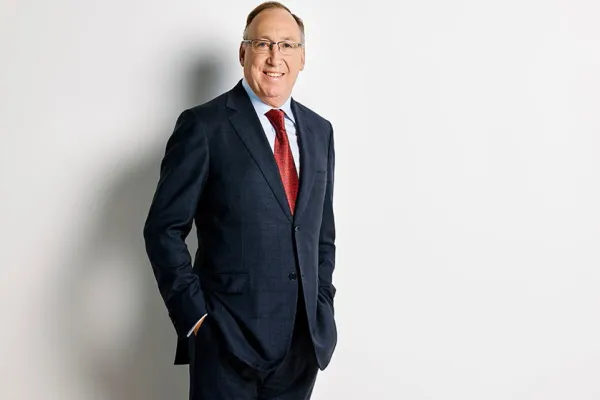Faith in aggregation
Much of the financial industry had high hopes for account aggregation - the technology that consolidates all of a client's financial statements on a single Web page - until the Internet bubble burst and demand for new online products fizzled. But ByAllAccounts president and CEO L. Patrick Gardner didn't waver in his faith, and his persistence has begun to pay off. His three-year-old company won a mandate in January to provide core technology for Boston-based State Street Corp.'s wealth management services business. As part of the deal, State Street bought a minority stake in privately held ByAllAccounts.
"This isn't just about capital," says a jubilant Gardner, who oversees a 30-employee team in Woburn, Massachusetts, that has established data-gathering links to 1,200 financial institutions' Web sites. "State Street brings distribution and expertise we wouldn't otherwise have access to," he adds.
State Street chose ByAllAccounts's WebPortfolio software because its analytical tools are well suited for high-net-worth investors' complex needs, says Anne Tangen, head of State Street's recently formed wealth manager services division. That explains why Gardner, a former Charles Schwab & Co. executive, has focused on the affluent market. "High-net-worth people simply have more accounts to aggregate," he asserts. "Aggregation has a place where there is serious money to gather." - Jeffrey Kutler
Portfolio strategy, by Ghosh
Shikhar Ghosh ruled the world of e-commerce before it had a name. Open Market, a software company he founded in Burlington, Massachusetts, in 1994 and took public a year later, created one of the first Internet publishing, payment and fulfillment systems. By 2000 Open Market had issued some 30,000 software licenses to online merchants around the globe. But Ghosh's Internet pure play crashed with the rest of the technology sector, and last year Chicago-based consulting conglomerate Divine acquired Open Market for $59 million - less than one tenth of its market value when Net stocks were booming.
Having decided early on that there would be other worlds to conquer - he stepped aside as Open Market's chief executive officer in 1995 - Ghosh has now landed squarely in e-finance. As CEO of Verilytics, also based in Burlington, Ghosh is selling powerful software that he says can simplify investment managers' lives. That makes Ghosh only the latest of many entrepreneurs with designs on adapting artificial intelligence techniques to investment strategy; others have met with mixed results, at best.
A native of New Delhi and a former Boston Consulting Group partner, Ghosh believes that the technology is best applied to managing large quantities of data, such as the thousands of quotes or positions that portfolio managers may want to monitor in real time but cannot handle on their own. Verilytics had those desires in mind when it designed its Financial Manager software to sift data and to call users' attention to significant events or changes. "With the right tools for processing information, an investment manager can be smarter," Ghosh explains.
Verilytics says that a half dozen financial institutions - including some big names - are using the investment management technology, but none has consented to having its identity disclosed. However, one of the sources of Ghosh's $22 million in early-stage financing was the secretive hedge fund group Moore Capital Management; indeed, hedge funds are among Verilytics's prime targets.
Verilytics lost some sales momentum in the recession, but the slowdown could also create opportunities. "Companies are looking for ways to save money," notes Gifford West, vice president for financial services. "One prospect is considering us to replace people who write
reports for other parts of the organization." - Jacqueline S. Gold
Everybody into the (issuance) pool
Wall Street has spent several years trying to streamline operations and lower costs by forming joint ventures in everything from fixed-income trading (multidealer platforms like Market Axess and TradeWeb) to foreign exchange (Atriax and FXall), from distributing analysts' reports (TheMarkets.com) to speeding securities settlements (Encompys, Global Straight Through Processing Association and Omgeo).
Now the Street is approaching another frontier: securities issuance.
Merrill Lynch & Co. and Citigroup's Salomon Smith Barney unit have joined forces with Microsoft Corp. and Thomson Corp.'s Thomson Financial subsidiary to create I-Deal. Its mission? To bring the economies of the Internet to bear on raising equity and debt capital.
"The concept is 'I-Deal inside,'" explains Scott Ganeles, I-Deal's chief executive officer, likening the company's approach to that of Intel Corp., which places the "Intel inside" logo on many different brands of computers. If, for example, Merrill Lynch and Goldman, Sachs & Co. both use the I-Deal platform, each will control the presentation and publishing of data to its end users, but the backroom machinery will be shared. "Capital markets professionals can concentrate on the parts of transactions that create the most value for clients," says Ganeles, formerly president of Carson Group, an investor relations business acquired by Thomson in 2000. Ganeles and Frank LaQuinta, a 14-year Merrill Lynch veteran now serving as I-Deal's chief technology officer, describe their operation as a virtual service provider, or VSP. "The VSP is designed to drive costs down and efficiencies up throughout the new-issue life cycle," LaQuinta explains.
Although I-Deal made its official debut in November, LaQuinta and others had been doing groundwork for a year. And Thomson folded its Dalcomp unit into I-Deal, contributing an existing book of municipal securities business as well as 70 of I-Deal's 150 total employees. But the new I-Deal infrastructure isn't scheduled for completion until late March.
Jerome Lienhard, senior vice president of investment funding at Freddie Mac and chairman of I-Deal's advisory board, is eager to get going. Lienhard says he will use I-Deal and will "strongly advocate its benefits to other potential users." Says Ganeles: "This is absolutely the best time for us to launch. We offer a clear value proposition and performance advantages - just what Wall Street needs in a down market." - J.K.
Longitude odds
Derivatives based on corporate earnings, the consumer price index or unemployment rates? Sounds like a long shot, especially at a time when the dark cloud of the Enron Corp. bankruptcy hangs ominously over the financial markets.
But that hasn't stopped New York-based Longitude from developing and marketing technology that can take risk-hedging in ever-more unusual directions. And the institutions like Deutsche Bank, J.P. Morgan Chase & Co. and others that are lining up as Longitude customers also appear undeterred. "We have not witnessed any diminishing enthusiasm among our clients," says Longitude chairman and CEO Andrew Lawrence. "To the contrary, we are on the verge of more significant partnership announcements."
Deutsche Bank signed with Longitude last year to create and sell products based on European and Japanese economic indicators. These are about a month away from availability, according to Kevin Rodgers, Deutsche's London-based chief of foreign exchange options. J.P. Morgan similarly plans to provide derivatives based on U.S. government economic statistics, which could be on the market by June. Swiss Reinsurance Co. joined the parade in January, intending to develop weather-based offerings this year. "Our technology is generic and scalable to any risk," says Lawrence, noting that derivatives markets have long been hungry for new products.
Lawrence, who worked at the old Bankers Trust Co. and Drexel Burnham Lambert, started Longitude in 1999 with Jeffrey Lange, a risk analytics expert who serves as Longitude's chief scientist. In November they obtained a U.S. patent on their core technology, Parimutuel Digital Call Auction. As the name implies, it shares some of the characteristics of pari-mutuel betting: It is a closed, self-clearing liquidity pool, with prices set by supply and demand and with payouts determined by the amounts paid in. Longitude earns fees based on volumes cleared in auctions on its neutral platform.
Deutsche's Rodgers says that his bank alone couldn't provide enough liquidity to make a market in, say, nonfarm payroll options. With the pari-mutuel pooling mechanism, he says, "We as a market maker don't have to take the other side of each trade, so we can satisfy more customer needs at comfortable spreads." - J.K.





